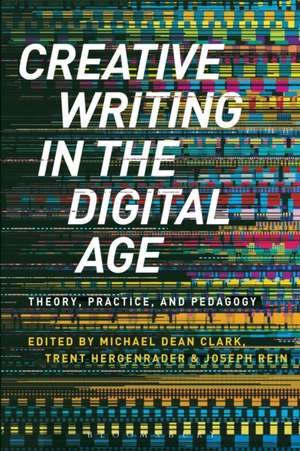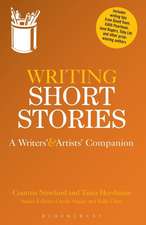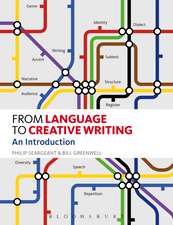Creative Writing in the Digital Age: Theory, Practice, and Pedagogy
Editat de Dr Michael Dean Clark, Dr Trent Hergenrader, Assistant Professor of Creative Writing Joseph Reinen Limba Engleză Paperback – 28 ian 2015
| Toate formatele și edițiile | Preț | Express |
|---|---|---|
| Paperback (1) | 229.86 lei 43-57 zile | |
| Bloomsbury Publishing – 28 ian 2015 | 229.86 lei 43-57 zile | |
| Hardback (1) | 714.35 lei 43-57 zile | |
| Bloomsbury Publishing – 28 ian 2015 | 714.35 lei 43-57 zile |
Preț: 229.86 lei
Preț vechi: 264.58 lei
-13% Nou
Puncte Express: 345
Preț estimativ în valută:
43.100€ • 47.81$ • 36.98£
43.100€ • 47.81$ • 36.98£
Carte tipărită la comandă
Livrare economică 21 aprilie-05 mai
Preluare comenzi: 021 569.72.76
Specificații
ISBN-13: 9781472574084
ISBN-10: 1472574087
Pagini: 208
Ilustrații: 2 halftones 4 tinted boxes
Dimensiuni: 156 x 234 x 11 mm
Greutate: 0.3 kg
Editura: Bloomsbury Publishing
Colecția Bloomsbury Academic
Locul publicării:London, United Kingdom
ISBN-10: 1472574087
Pagini: 208
Ilustrații: 2 halftones 4 tinted boxes
Dimensiuni: 156 x 234 x 11 mm
Greutate: 0.3 kg
Editura: Bloomsbury Publishing
Colecția Bloomsbury Academic
Locul publicării:London, United Kingdom
Caracteristici
Explores the principles, practices and opportunities of using technology in the Creative Writing classroom
Notă biografică
Michael Dean Clark is Associate Professor of Writing at Azusa Pacific University, USA. Formerly an award-winning journalist, he is an author of fiction and nonfiction focused on loss, grace, and uncommon redemption. His fiction and nonfiction work has appeared in Fast Forward, Relief, Coach's Midnight Diner, and elsewhere. Trent Hergenrader is Assistant Professor at the Rochester Institute of Technology, USA. His academic research connects game-based learning and writing instruction, and his short fiction has appeared in such places as Fantasy & Science Fiction and Best Horror of the Year #1. Joseph Rein is Assistant Professor of Creative Writing at the University of Wisconsin-River Falls, USA. His creative and critical work has appeared in such publications as The Pinch Literary Journal, Laurel Review and New Writing, and he is co-editor of the book Dispatches from the Classroom: Graduate Students on Creative Writing (2011).
Cuprins
1. Introduction Part 1: Digital Influences on Creative Writing Studies2. Creative Writing in the Age of Synapses (Graeme Harper, Oakland University, USA) 3. Screening Subjects: Workshop Pedagogy, Media Ecologies, and (New) Student Subjectivities (Adam Koehler, Manhattan College, USA)4. Concentration, Form, and Ways of Seeing (Anna Leahy, Chapman University, USA)5. Game Spaces: Videogames as Story-Generating Systems for Creative Writers: (Trent Hergenrader, Rochester Institute of Technology, USA)6. "But What Can I Do with a Writing Degree?": Using Technology to Leverage More Use from the Fiction Course (Michael Dean Clark, Point Loma Nazarene University, USA)7. Digital Divides?: Two Creative Writers Look Askance at Composition Studies (Joe Amato and Kass Fleisher, Illinois State University, USA)Part 2: Using Digital Tools as Creative Practice8. Lost in Digital Translation: Navigating the Online Creative Writing Classroom (Joseph Rein, University of Wisconsin-River Falls, USA) 9. Giving an Account of Oneself: Teaching Identity Construction and Authorship in Creative Nonfiction and Social Media (Janelle Adsit, State University of New York-Albany, USA)10. Reconsidering the Online Writing Workshop with #25wordstory (Abigail Scheg, Elizabeth City State University, USA)11. Writing with Machines and Taroko Gorge (Jim Brown, University of Wisconsin-Madison, USA)12. Telling Stories with Maps and Rules: Using the Interactive Fiction Language "Inform 7" in a Creative Writing Workshop (Aaron Reed, University of California-Santa Cruz, USA)13. Acting Out: Netprov in the Classroom (Rob Witting, University of Minnesota-Duluth, and Mark Marino, University of Southern California-Dornsife, USA)14. Just What is Digital Storytelling, Anyway? (Christina Clancy, Beloit College, USA)15. Creative Writing for New Media (Amy Letter, Drake University, USA)BibliographyIndex
Recenzii
A valuable resource for pedagogy and practice ... [This] book offers a strong starting place from which to consider how creative writing might be vibrant within the university and fulfill its role in educating students from all fields.
Marrying digital tools to assist students in the classroom teaching of creative writing is a major challenge. For these teachers Creative Writing in the Digital Age is a game changer ... [This] is a book that looks to the future and to the survival of writing in global culture.
This book should have great value for teachers of creative writing seeking to connect with games, social media, and other digital developments. It also demonstrates how creative practice can animate and inform the Digital Humanities, and makes compelling reading for anyone interested in the present and future of writing.
With this book, creative writing theory and pedagogy finally arrives in the twenty-first century with both feet planted firmly on the ground and leaning toward the future. A rich compendium that stakes out a territory from which to consider the countless ways in which digital culture influences the creative writing classroom, Creative Writing in the Digital Age will influence how you teach and how you think about teaching. It's a game changer-and it's about time.
Creative writing in the academy has for too long been wedded to a print-based worldview and a rather narrow range of literary aesthetics. Creative Writing in the Digital Age confronts both of those issues directly. This book is much more than a guide for creative writing as it looks toward the future; it is also a manifesto for how creative writing can survive--and thrive--in the present.
Marrying digital tools to assist students in the classroom teaching of creative writing is a major challenge. For these teachers Creative Writing in the Digital Age is a game changer ... [This] is a book that looks to the future and to the survival of writing in global culture.
This book should have great value for teachers of creative writing seeking to connect with games, social media, and other digital developments. It also demonstrates how creative practice can animate and inform the Digital Humanities, and makes compelling reading for anyone interested in the present and future of writing.
With this book, creative writing theory and pedagogy finally arrives in the twenty-first century with both feet planted firmly on the ground and leaning toward the future. A rich compendium that stakes out a territory from which to consider the countless ways in which digital culture influences the creative writing classroom, Creative Writing in the Digital Age will influence how you teach and how you think about teaching. It's a game changer-and it's about time.
Creative writing in the academy has for too long been wedded to a print-based worldview and a rather narrow range of literary aesthetics. Creative Writing in the Digital Age confronts both of those issues directly. This book is much more than a guide for creative writing as it looks toward the future; it is also a manifesto for how creative writing can survive--and thrive--in the present.








